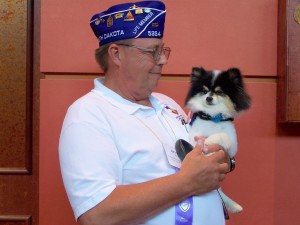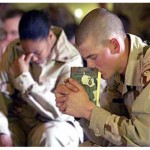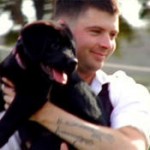Sep
8
A New Beginning
Filed Under PTSD treatment, Treating PTSD | 1 Comment
-by Janet Seahorn

In a previous blog we wrote about the Wilderness and Healing. Before that we talked about how PTSD + Joy = Peace, Maybe — can move us toward wellbeing.
This week’s focus is a continuation of both ideas, an extension of how we can heal, can move forward and grow healthier. What every suffering person is searching for is a GENISUS – a new beginning, new start, a sort of rebirth.
So this is the big question, “what will be our new beginning after a trauma experience?” Trauma does not have to be the end of living, but a start of living life in a new way. It begins with the seeds we are now and grows into the people we want to become.
Imagine that person, vision it with all the bright pictures, melodies, and glory we can see, hear, and feel in our hearts. New beginnings ask us to examine what we learned from our combat/trauma experience, to go beyond the pain and terrible memories, and to rise above them.
To accomplish this mission will require that we put ourselves fully into the human arena. Isolation is not an option. We cannot lock ourselves away physically or emotionally; that means drugs, alcohol, over-working… are simply not possible choices.
The world is too rich, too interesting, too special to isolate ourselves. Yes, there are horrible things that occur. There is violence, greed, and cruel acts. And for every act of brutality, I believe there are many more acts of kindness, beauty, and love. We must not forget to notice these during our times of darkness. We must attempt to appreciate the goodness in the world. It is present. Just look.
An old saying states, “What we focus on persists”. What do we want to persist? We can focus on those things. Write them up. Put them on our refrigerators, nightstands, even our mirrors. The new us begins today. We choose. By no means will it be easy. The new us will not be perfect, but it will be real.
Like the Velveteen Rabbit, he became worn, torn, and aged only through the experience of being touched, loved, and used. And by going through all of his living, he became real. He developed into being alive, for being alive required a multitude of life events both magnificent and sad.
I am sure that if one were to inspect the experiences of the rabbit, he may have been diagnosed with PTSD. And, I am equally sure, that at the end of his days, he would not have traded these experiences for something easier and less physically or emotionally demanding.
He chose life, and so will we!
Sep
1
Never Apart
Filed Under Dogs, Pets, PTSD treatment, Purple Heart | 1 Comment
by Janet & Tony Seahorn
 It was a small, black & white, furry 5-pound bundle of emotional and physical relief. His name was Petie, the keeper of an adult warrior, Purple Heart, Vietnam Veteran.
It was a small, black & white, furry 5-pound bundle of emotional and physical relief. His name was Petie, the keeper of an adult warrior, Purple Heart, Vietnam Veteran.
The vet trained him as his first alert. An important task. Petie knew when his master needed to take his medications. He would wakeup Dennis at various times in the middle of the night so that specific pills were administered at the most critical time in order to keep the Post Traumatic Stress under control.
Dennis trained Petie especially for this purpose. They are best friends and constant companions, never apart. This small, furry medic is essential, not just for the vet’s physical well-being, but even more important, his emotional/mental stability.
Petie alerts Dennis when there is danger in the surroundings. He watches intently everything that goes on with his owner and around his owner. If Petie isn’t comfortable his master knows to pay closer attention to his current environment. If Petie doesn’t like you, more than likely Dennis isn’t going to become too friendly either.
They coexist, two different species, one functioning entity.
There are numerous organizations that train service dogs. Dogs that serve the deaf, blind, and epileptic individual. Dogs that act as the arms and legs of those who no longer have capacity to move on their own. Now, some of these groups are training dogs to do something even more challenging, knowing when their owner may go into a PTSD anxiety attack.
The dog must sense when such attacks may occur before they actually manifest themselves. They know even before the person that something is coming on – giving their owner an opportunity to breathe, use relaxation techniques, and take medication if necessary. They provide a sense of security and well-being in a world filled with unpredictability and potential stressors.
One such training organization is NEADS – Dogs for Deaf and Disabled Americans.
They are conducting an in-depth study of nine-ten Iraq vets who has severe PTSD. The study’s focus is to evaluate the most effective canine training methods that serve the sensitive needs of a veteran suffering from combat stress.
This is a very expensive and challenging research project because it must take into account the behaviors of two very different organisms: human and canine.
It will be a critical piece of information given the increasing number of individuals returning from the Iraq and Afghanistan theaters and those that have served in past wars such as Vietnam and the Gulf War.
Apr
15
What Others Say About PTSD
Filed Under PTSD treatment | 3 Comments
 In the last few months I have written about characteristics and effects of PTSD. Some of the information came from years of living with someone with PTSD. Some of it came from over a decade of research. And, some of the information was the result of interviews carried out over the last eight years with families, vets, and civilian populations. A recent blog focused on “What I know for Sure” about this illusive, emotional oppressor and I ended with a comment from a newspaper article where an Iraq veteran stated that admitting he had served in Iraq or Afghanistan was like the plague because employers were apprehensive about hiring vets with PTSD. Reading this put me into a very philosophical guilt trip. We are trying to educate communities, veterans, families and friends about Post-Traumatic Stress Disorder. However, by no means is the information meant to make the vet look incompetent or out of control. PTSD is like any other challenge. Most of the conflict occurs within the person, and behind closed doors. For the most part, few people outside the immediate family have little if any idea of the torment and struggle going on within the individual.
In the last few months I have written about characteristics and effects of PTSD. Some of the information came from years of living with someone with PTSD. Some of it came from over a decade of research. And, some of the information was the result of interviews carried out over the last eight years with families, vets, and civilian populations. A recent blog focused on “What I know for Sure” about this illusive, emotional oppressor and I ended with a comment from a newspaper article where an Iraq veteran stated that admitting he had served in Iraq or Afghanistan was like the plague because employers were apprehensive about hiring vets with PTSD. Reading this put me into a very philosophical guilt trip. We are trying to educate communities, veterans, families and friends about Post-Traumatic Stress Disorder. However, by no means is the information meant to make the vet look incompetent or out of control. PTSD is like any other challenge. Most of the conflict occurs within the person, and behind closed doors. For the most part, few people outside the immediate family have little if any idea of the torment and struggle going on within the individual.
While driving to Wyoming last week, I read an article in Scientific American by David Dobbs (April 2009) titled, “The Post-Traumatic Stress Trap”. The main idea of this piece centered on “a growing number of experts insist that the concept of post-traumatic stress disorder is itself disordered and that soldiers are suffering as a result” (p. 64). As I read the piece I both agreed and disagreed with what Mr. Dobbs wrote. There is no doubt that many people showing symptoms of any type of illness or disorder may be misdiagnosed, and when this occurs treatments are not only ineffective, but may even be harmful to the patient. PTSD is no exception. Just diagnosing, it can be tricky because its symptoms can mask other ailments such as depression, memory problems, and traumatic brain injuries. A helpful statement by Mr. Dobbs reminded the reader that for many vets returning from combat, normal readjustment may take months and even a few years to get back to regular existence. “Seeing most post-combat distress not as a disorder but as part of normal, if not painful, healing” (p. 68), may take some of the stigma away from the trauma of combat.
All of that is fine. Yet, as a researcher, I also know that for those who are misdiagnosed, many may never be identified due to lack of nearby medical facilities or lack of awareness. The last point Mr. Dobbs made, and I believe it is legitimate, refers to revising the rubric for more accurately diagnosing of PTSD. At any rate, the real challenge continues to be accurate identification of PTSD, effective treatment options, and correct information to increase awareness. PTSD is far more than a mere “adjustment” problem. The sufferer and the family need immediate and appropriate interventions if restorative health is to be obtained. As a nation, we have our work cut out for us, because a nation that forgets it warriors, fails its moral and humanitarian obligations to restore to physical and emotional health those it sends into battle. We must always take action; we must always remember that “If we send them, we must mend them”.
Mar
10
Freedom dogs help with PTSD
Filed Under PTSD treatment | Comments Off on Freedom dogs help with PTSD

We’ve all seen how dogs and other pets can have healing powers. A pilot program in California pairs service dogs with returning veterans with brain injuries and emotional problems. Freedom Dogs is a non-profit agency in San Diego that trains service dogs to do anything from retrieving items to providing a comforting distraction from PTSD symptons. To read the full story, click here.

